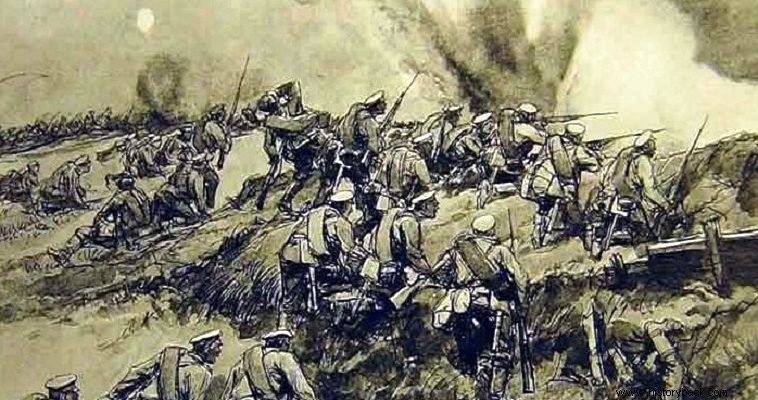
The "Brusilov Offensive" was the greatest Russian military success in World War I. However, it too managed to be tarnished by the incompetence of some Russian generals. The offensive of General Brusilov, admittedly the best Russian commander-in-chief during World War I, began brilliantly on June 4, 1916.
Brusilov's plan called for an attack on the Austrians in Galicia with the aim of crushing them rather than forcing Vienna to withdraw from the war. Initially, four Russian armies with 40 Infantry Divisions (MP) and 15 Cavalry Divisions (MI) participated in the attack. One of the armies was that of the Tsarist Guard (Tsarist Guard Army - STF) which supposedly included the elite of the Russian army.
This army was commanded by General Vladimir Mikhailovich Bezobrazov, a general who owed his position to his close relations with the tsarist environment. The army had the I and II Guards Corps (SF), the Guard Cavalry Corps (SIF), the I Army Corps (SS), the XXX SS and the V Cavalry Corps (SI) .
Attack
The STF attack began on June 28, 1916, targeting the city of Kovel. But the Guards were called upon to attack in such unassailable ground that it was rumored that it had been chosen… by the Germans and not by their commander. The marshes and dense stands of trees did not allow the development of forces except in narrows covered by the enemy machine guns and which were marked targets for the enemy artillery.
Despite their courage, the Guards did little. “The situation is miserable… The units are badly deployed. The marshes are impassable outside of narrow corridors. The XX SS is left with 10,000 men of the 30,000 it was supposed to have... the I SS is also left with 10,000 men. The losses of the Guards are estimated at 30,000 men , said eyewitness British military attache to Russia Major General Alfred Knox.
The other Cappadocian Paul
Faced with the horrific losses of the frontal attacks Grand Duke Pavlos, commander of the 1st SF was ordered to carry out a flank attack, but he refused, as it did not "honor him and his guards"! So he attacked head on... The Light Infantry regiment of the Guard and the famous, historic Preobrazhensky regiment, founded by Peter the Great, charged through the marshes and, as expected, were cut to pieces.
Some guards dived into the marshes and tried to creep closer to the enemy positions. But enemy artillery and aircraft were reaping them. The others got stuck in the mud between the enemy-marked passes and were needlessly, unfairly, en masse swept by the enemy machine guns.
Many others met a tragic death in the swamps. Finally, due to poor coordination, the Russian artillery began to cut them to pieces, in turn, as the gunners believed that the I SF would have attacked from the side and not from the front! The Guardians managed to capture part of the enemy location but the cost was incredible. Losses exceeded 50% of their commanding force – 55,000 dead wounded, missing... while in some units they exceeded 70%.
“I heard about the attack of the Light Infantry. The chosen field of attack was the most inappropriate one imaginable. The men had to wade through the swamp with water up to their waists. Casualties are estimated at 70% but were greater due to their habit of maneuvering in dense formation...The wounded were slowly sinking into the swamp and no one could help them... , Knox reports.
Both Bezobrazov and Grand Duke Paul were relieved of their duties. but they were never punished for the slaughter of their men.
